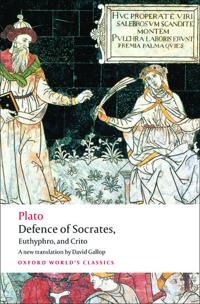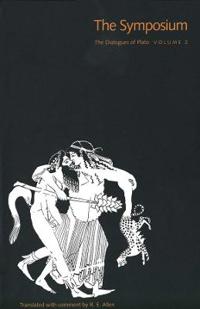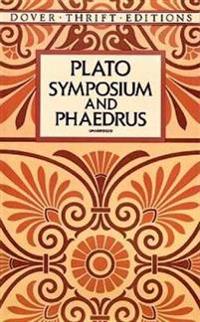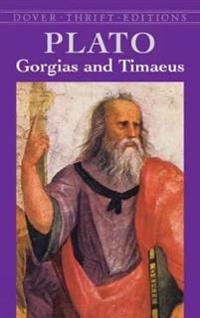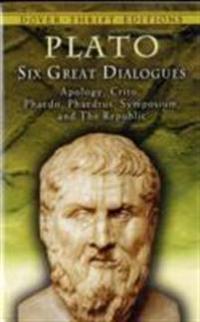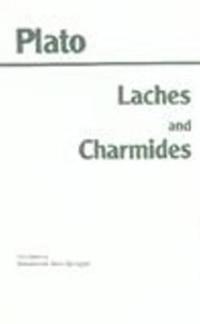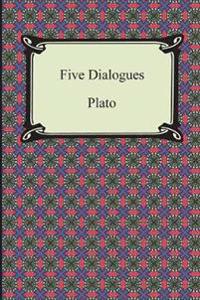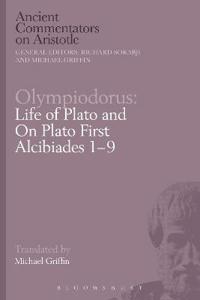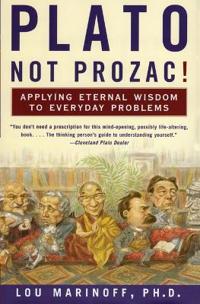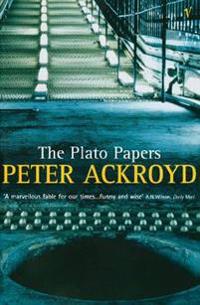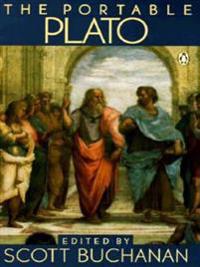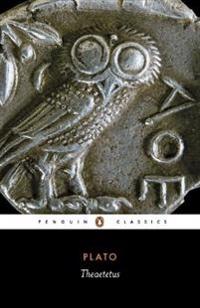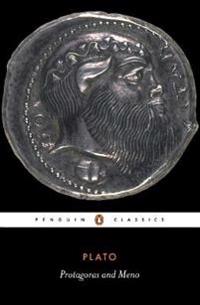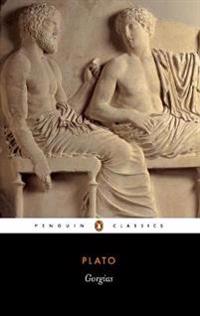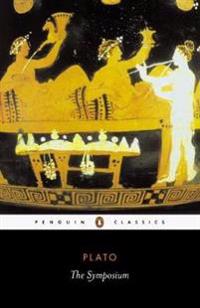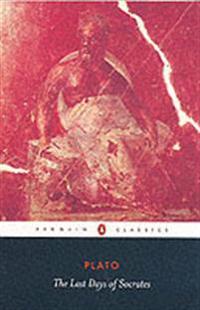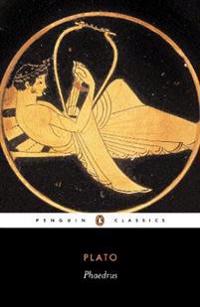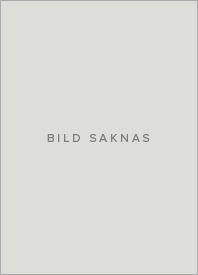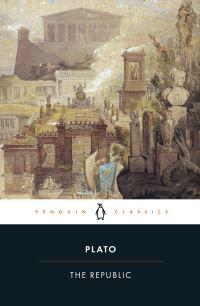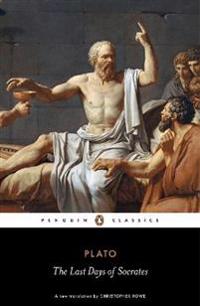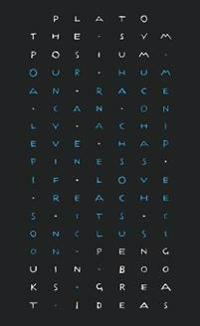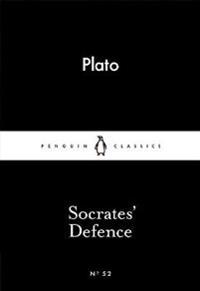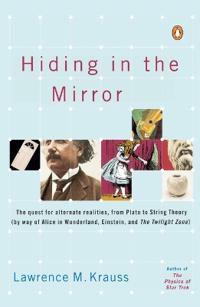Defence of Socrates, Euthyphro, Crito (Pocket)
avPlato, David Gallop, Plato
ISBN: 9780199540501 - UTGIVEN: 200807These new translations present Plato's remarkable dramatization of the momentous events surrounding the trial of Socrates in 399 BC, on charges of irreligion and corrupting the young. The Euthyphro, Defence of Socrates, and Crito form a dramatic and thematic sequence, raising fundamental questions [...]
The Symposium (Pocket)
avPlato, Reginald E. (TRN) Allen, Plato
ISBN: 9780300056990 - UTGIVEN: 1993-09"The unexamined life is not worth living." Socrates's ancient words are still true, and the ideas sounded in Plato's "Dialogues" still form the foundation of a thinking person's education. This superb collection contains excellent contemporary translations selected for their clarity and accessibilit[...]
Symposium and Phaedrus (Pocket)
avPlato, Benjamin Jowett, Plato
ISBN: 9780486277981 - UTGIVEN: 199401Gorgias and Timaeus (Pocket)
avPlato, Benjamin Jowett, Plato
ISBN: 9780486427591 - UTGIVEN: 2003-07Reading Plato, Tracing Plato: From Ancient Commentary to Medieval Reception (Inbunden)
avStephen Gersh
ISBN: 9780860789697 - UTGIVEN: 2005-03-14Laches ; And, Charmides (Pocket)
avPlato, Rosamond Kent Sprague, Plato
ISBN: 9780872201347 - UTGIVEN: 1992-06Rosamond Kent Sprague's translations of "The Laches and Charmides" are highly regarded, and relied on, for their lucidity and philosophical acuity. This edition includes notes by Sprague and an updated bibliography.[...]
Republic (Inbunden)
avPlato, C. D. C. Reeve, Plato
ISBN: 9780872207370 - UTGIVEN: 2005-01This edition, translated from the New Standard Greek Text by C. D. C. Reeve, includes an Introduction, select bibliography, a synopsis of each book, a glossary of terms, a glossary and index of names, and a general index[...]
Five Dialogues (Pocket)
avPlato, Benjamin (TRN) Jowett, Plato
ISBN: 9781420946970 - UTGIVEN: 2013-01Olympiodorus: Life of Plato and on Plato First Alcibiades 1-9 (häftad)
ISBN: 9781474295642 - UTGIVEN: 2016-06Olympiodorus (AD c. 500 570), possibly the last non-Christian teacher of philosophy in Alexandria, delivered these lectures as an introduction to Plato with a biography. For us, they can serve as an accessible introduction to late Neoplatonism. Olympiodorus locates the First Alcibiades at the start [...]
Plato Not Prozac (Häftad)
avLou Marinoff
ISBN: 9780060931360 - UTGIVEN: 200002If you're facing a dilemma -- whether it's handling a relationship, living ethically, dealing with a career change, or finding meaning in life -- the world's most important thinkers from centuries past will help guide you toward a solution compatible with your individual beliefs. From Kirkegaard's t[...]
Plato Papers (Häftad)
avPeter Ackroyd
ISBN: 9780099289951 - UTGIVEN: 200003Plato, the orator, summons the citizens of London on ritual occasions to impart the ancient history of their city. He dwells particulary on the unhappy era of Mouldwarp (AD 1500-2300), which existed before the dimming of the stars and the burning of the machines. But then he is put on trial.[...]
The Portable Plato (häftad)
ISBN: 9780140150407 - UTGIVEN: 1977-03Writing in the fourth century B.C., in an Athens that had suffered a humiliating defeat in the Peloponnesian War, Plato formulated questions that have haunted the moral, religious, and political imagination of the West for more than 2,000 years: what is virtue? How should we love? What constitutes a[...]
Theaetetus (Storpocket)
avPlato
ISBN: 9780140444506 - UTGIVEN: 198703Set immediately prior to the trial and execution of Socrates in 399 BC, Theaetetus shows the great philosopher considering the nature of knowledge itself, in a debate with the geometrician Theodorus and his young follower Theaetetus. Their dialogue covers many questions, such as: is knowledge purely[...]
Protagoras and Meno (Storpocket)
avPlato
ISBN: 9780140449037 - UTGIVEN: 200510Exploring the question of what exactly makes good people good, Protagoras and Meno are two of the most enjoyable and accessible of all of Plato's dialogues. Widely regarded as his finest dramatic work, the Protagoras, set during the golden age of Pericles, pits a youthful Socrates against the revere[...]
Gorgias (Pocket)
avPlato, Walter (TRN) Hamilton, C. J. (TRN) Emlyn-Jones
ISBN: 9780140449044 - UTGIVEN: 2004-07Taking the form of a dialogue between Socrates, Gorgias, Polus and Callicles, "Gorgias" debates perennial questions about the nature of government and those who aspire to public office. Are high moral standards essential or should we give our preference to the pragmatist who gets things done or nego[...]
The Symposium (Storpocket)
avPlato
ISBN: 9780140449273 - UTGIVEN: 200302Unfolding in an informal setting, Plato's "The Symposium" is a powerful discussion on the nature of love, translated from the Greek with notes and an introduction by Christopher Gill in "Penguin Classics". In the course of a lively drinking party, a group of Athenian intellectuals exchange views on [...]
The Last Days of Socrates (Storpocket)
avPlato
ISBN: 9780140449280 - UTGIVEN: 200303The trial and condemnation of Socrates on charges of heresy and corrupting young minds is a defining moment in the history of Classical Athens. In tracing these events through four dialogues, Plato also developed his own philosophy, based on Socrates' manifesto for a life guided by self-responsibili[...]
Phaedrus (Storpocket)
avPlato
ISBN: 9780140449747 - UTGIVEN: 200508Phaedrus is widely recognized as one of Plato's most profound and beautiful works. It takes the form of a dialogue between Socrates and Phaedrus and its ostensible subject is love, especially homoerotic love. This new translation is accompanied by an introduction, further reading, and full notes on [...]
Timaeus and Critias (Storpocket)
avPlato
ISBN: 9780140455045 - UTGIVEN: 2008-08"Timaeus and Critias" is a Socratic dialogue in two parts. A response to an account of an ideal state told by Socrates, it begins with Timaeus' theoretical exposition of the cosmos and his story describing the creation of the universe, from its very beginning to the coming of man. Timaeus introduces[...]
The Republic (Storpocket)
avPlato
ISBN: 9780140455113 - UTGIVEN: 200705Presented in the form of a dialogue between Socrates and three different interlocutors, "Republic" is an enquiry into the notion of a perfect community and the ideal individual within it. This work addresses the purpose of education and the role of both women and men as 'guardians' of the people.[...]
The Last Days of Socrates (Häftad)
avPlato
ISBN: 9780140455496 - UTGIVEN: 201010'Consider just this, and give your minds to this alone: whether or not what I say is just'. Plato's account of Socrates' trial and death (399 BC) is a significant moment in Classical literature and the life of Classical Athens. In these four dialogues, Plato develops the Socratic belief in responsib[...]
The Symposium (Pocket)
avPlato
ISBN: 9780141023847 - UTGIVEN: 200508Throughout history, some books have changed the world. They have transformed the way we see ourselves and each other. They have inspired debate, dissent, war and revolution. They have enlightened, outraged, provoked and comforted. They have enriched lives and destroyed them. Now Penguin brings you[...]
Socrates' Defence (Häftad)
avPlato
ISBN: 9780141397641 - UTGIVEN: 2015-02'I'll stop doing it as soon as I understand what I'm doing.' Somewhere between a historical account and work of philosophy, Socrates' Defence details the final plea of Plato's beloved mentor. Introducing Little Black Classics: 80 books for Penguin's 80th birthday. Little Black Classics celebrate the[...]
Hiding in the Mirror: The Quest for Alternate Realities, from Plato to String Theory (by Way of Alicein Wonderland, Einstein, and the Twilig (Häftad)
avLawrence M. Krauss
ISBN: 9780143038023 - UTGIVEN: 200611Draws on the works of scientists, mathematicians, artists, and writers, from Einstein and Picasso to C. S. Lewis, to consider the plausibility and human concept of alternate universes, exploring popular theories and misunderstandings about such topics as black holes, life in other dimensions, and st[...]

